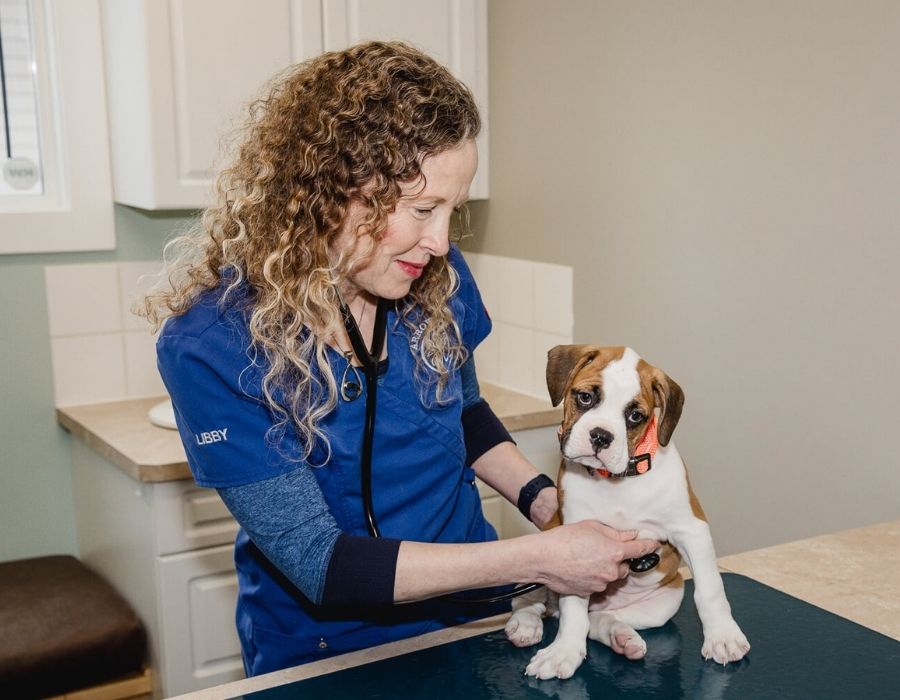Services
Pet Vaccinations

Dog Vaccinations
There are 2 vaccines that we consider “core” vaccines for every dog.
- Distemper/Parvovirus/Adenovirus/Parainfluenza. This is a combination vaccine that protects against several different viruses. The most common of these diseases are distemper and parvovirus. Parvovirus is a highly contagious virus that causes severe vomiting, diarrhea, and immunosuppression. Distemper can also cause vomiting and diarrhea, as well as neurologic disease. Both of these viruses can be fatal and are spread by dogs, coyotes, and foxes. This vaccine requires 3 boosters to be given to puppies (3-4 weeks apart), is then given annually for 1-2 years, then every 3 years ongoing.
- Rabies. Rabies is a deadly virus that attacks the neurologic system. It is almost 100% fatal to dogs, cats, and humans. It is prevalent in the bat population in Alberta, which means that this virus can be found in urban as well as rural settings. It can also be spread by foxes, raccoons, skunks, and coyotes. Rabies is spread through contact with an infected animal’s saliva. This vaccine is given at approximately 4 months of age, then again at 1yr of age, then every 3 years ongoing.
There are several vaccinations that your dog may require depending on their lifestyle.
- The most common of these vaccinations is bordetella or “kennel cough.” This vaccine combines Canine Adenovirus type 2, Parainfluenza, and Bordetella Bronchiseptica. These are highly contagious viruses that can cause upper respiratory infections and occasionally lead to secondary pneumonia. This vaccination is required for most boarding facilities, groomers, daycare, and dog classes and is recommended for dogs that go frequently to off-leash parks.
- We also offer Lyme, Leptospirosis, and Canine Influenza vaccines which are typically recommended for dogs that travel outside of Alberta. Please talk with one of our veterinarians at your vaccine consultation to see if your dog is a good candidate for any of these vaccinations.
Vaccination reactions are very uncommon in dogs. The most common reactions we see are local tenderness, swelling, mild lethargy, and reduced appetite. These symptoms usually resolve within 24-48hrs. More serious reactions include hives, vomiting, weakness, and collapse. These reactions would typically happen within a few hours of vaccination and are extremely rare (less than 1 in 1000 dogs).
If you have any further questions about vaccinations and your dog, please don’t hesitate to call the clinic at 403-932-2370.
Cat Vaccinations
Vaccinations are an important tool in keeping your cat healthy. Vaccines use the body’s natural defenses to build resistance to specific infections and make the immune system stronger. Vaccinations exist for all different types of disease throughout all different species.
There are 2 vaccines that we consider “core” vaccines for every cat.
- Feline Viral Rhinotracheitis, Calicivirus and Panleukopenia. These viruses can cause a multitude of symptoms, ranging from respiratory disease to eye disease to immunosuppression. Some of these viruses can recur throughout the cat’s life and can cause chronic health problems. These viruses are highly contagious and can be brought into the home through clothing, shoes, and other objects from the outdoors. This vaccine requires 3 boosters to be given to kittens (3-4 weeks apart), is then given at 1 year, then every 3 years ongoing.
- Rabies. Rabies is a deadly virus that attacks the neurologic system. It is almost 100% fatal to dogs, cats, and humans. It is prevalent in the bat population in Alberta, which means that this virus can be found in urban as well as rural settings. Rabies is spread through contact with an infected animal’s saliva. Although indoor cats are certainly at lower risk for Rabies exposure than pets that go outside, there have been cases where rabid bats have been discovered in homes. There is also the chance that an indoor cat could escape outside. We recommend both indoor and outdoor cats be vaccinated for Rabies.
Some cats are also recommended to have the Feline Leukemia vaccination. This vaccination is generally recommended for cats that have contact with an outdoor population of cats or live with a cat that has Feline Leukemia.
Vaccination reactions are very uncommon in cats. Our clinic uses only non-adjuvanted vaccinations in cats as this lowers their risk of a vaccination reaction even further. The most common reactions we see are local tenderness, swelling, mild lethargy, and reduced appetite. These symptoms usually resolve within 24-48hrs. More serious reactions include hives, vomiting, weakness, and collapse. These reactions would typically happen within a few hours of vaccination and are extremely rare (less than 1 in 1000 cats).
If you have any further questions about vaccinations and your cat, please don’t hesitate to call the clinic at 403-932-2370.
